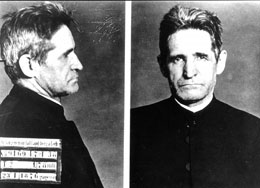So, if you follow the news, you’ve heard by now that Mitt Romney said that he is not concerned about the very poor. And, he’s already taking a lot of heat, including some from Gail Collins, and (my favorite so far), Jon Stewart.
He’s also defending the comments, saying that he said he would fix the safety net for the very poor if it needs fixing, but also that he is very clear that his focus is on the struggling middle class.
There is certainly room for people of good will to disagree and to make different prudential judgments about the sorts of policy decisions that will best help the very poor. And of course, Mr. Romney and others are free to think as they please. But for Catholics, being unconcerned with the very poor is not an option.
As they do each election year, the US Bishops have published Forming Consciences for Faithful Citizenship, which they hope will help Catholics understand and apply the Church’s teaching to their political decisions. One of their seven key themes is the idea of the Option for the Poor and Vulnerable:
While the common good embraces all, those who are weak, vulnerable, and most in need deserve preferential concern. A basic moral test for our society is how we treat the most vulnerable in our midst. In a society marred by deepening disparities between rich and poor, Scripture gives us the story of the Last Judgment (see Mt 25:31-46) and reminds us that we will be judged by our response to the “least among us.” (#50)
Catholics need to be concerned about the very poor, and Catholic voters, I think, need to find and identify candidates who share that concern.





Thanks for drawing attention to this comment, Dana. The sad thing is that Obama has largely focused on the struggles of the middle class as well. I wish that both would put more emphasis on those who are hurting the most.
Julie, thanks for pointing out that Obama is singing the same song on this (though his rhetoric is seldom this bad on this issue). Certainly Catholics can’t expect that any candidate embodies our values on every issue, but I think it’s important to point out the moments where they reveal how far away they are from those values.
Dana, I think it’s regrettable that so many have taken Romney’s words out of context. It’s obvious to me that he really does care about the poor as he gives (15%) of his income to his church. I agree, it was a poor choice of words only because people like John Stuart, etc., take it out of context. I agree with Romney in that, at least there are safety nets in place for the very poor. In my opinion, requiring people to give more money to the government, which turns around and spends it on things like funding Planned Parenthood and Solyndra, is not helping the very poor and is not how I think God wants me to contribute to helping the very poor. I would rather give my money to my church where I know almost 100 cents out of each dollar goes to those in need versus a few pennies out of each dollar in tax money. Obama would have everyone dependent on the government if he had his way.